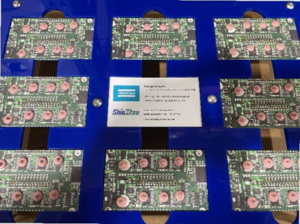Shin-Etsu Silicones to showcased key thermal interface materials at 2024 Battery Show
Akron, OH – Responding to the rapid growth and increasing importance in the global battery and EV sectors, Shin-Etsu Silicones of America (SESA: A U.S. subsidiary of Shin-Etsu Chemical Co. Ltd., Japan) showcased their SDP-6560 A/B liquid-dispensed gap filling, non-adhesive curing silicone thermal interface material (TIM) at the largest battery technology expo in North America, the 2024 Battery Show held in Detroit. Part of the high performing SDP Series, which are two-part, room-temperature cure silicone-based materials, the product acts as a thermal interface gap filler−providing exceptional thermal conductivity and excellent insulation for electronics applications requiring thermal dissipation.
SDP-6560 A/B cures at room-temperature when the two components are mixed. After curing, the material has low hardness−translating to less stress on components. Because of the addition reaction, curing time is shortened by heating. Moreover, it can be reworked because it does not adhere to substrates. Notably, its grease-like consistency allows the material to flow into the nooks and crannies lowering the contact resistance over a variety of metal substrates.
Developed to provide progressive options to thermal engineers in the growing EV market sector for silicone, SDP-6560 A/B is uniquely suited to transfer the temperature out of the electronic part to the housing. While the gap fillers can be used on a myriad of electronic parts on an EV, they are primarily used around battery cells. Key applications include usage in the battery management systems to the electronic control unit (ECUs) in the cars, or even the entertainment system.
SDP-6560 A/B series liquid dispense gap fillers are the answer to providing high thermal conductivity over a large range of gap thicknesses requiring thermal dissipation. Easily dispensable, in even complicated patterns, this range of gap fillers cures to a soft elastomer−providing flexibility and electrical isolation between components.
Since the requirements for adhesive bonding, sealing, and potting processes are becoming increasingly individual, SESA partnered with Atlas Copco (Auburn Hills, MI / part of the Atlas Copco Group) for a demonstration at the Battery Show featuring their DispensingCell DC 803 machine.
Having worked with the company for many years in the US and Europe, the demo leveraged the multifunctional modular designed machine for dispensing the product on a business card-like PCB sample. Designed for demanding applications (and gap fillers specifically), the unit is speed adjustable and was set according to SESA’s unique material specifications.
Notably, an XYZ robot was used in the demo to dispense the soft material to fill gaps with precise contour encapsulation efficiency−thanks to its high-performance axis system. Continuous monitoring also ensured precise dispensing results for the PCB business card sample demo.
According to Atlas Copco’s Business Line Manager, Johannes Blaser, “DispensingCell DC 803’s modular design and numerous equipment options allow for flexible configuration and rapid adaptation to changed processes and serie’s sizes. The further development of the proven CNCell has been specially tailored to the requirements of industrial series production with short cycle times and high quantities−enabling demand-oriented system planning.”
According to North American Marketing Manager, Eric Bishop, “Shin-Etsu’s collaboration with our industry leading dispensing equipment partner, Atlas Copco, at the 2024 Battery Show demo allowed us to explore what the possibilities are for our SDP-6560 A/B product. The advanced handling and dispensing properties that were run in the production of the PCB business card sample stretched the boundaries of its complex configuration. The synergistic effort allowed us to take full advantage of the latest developments in silicone material for demanding EV applications and dispensing technology.”
In addition to the SDP-6560 A/B gap fillers, Bishop noted that they also showcased another EV-ready V-O HCR (High Consistency Rubber) material that is ideal for the growing EV sector−SESA’s SV-9X001-U Series. The material has excellent electrical and flame-retardant properties and features the following range of specs:
Hardness: Type A=40-80 / Tensile Strength: ASTM (MPa)=3.9-6.3 / Tear Strength: DIE-B (kN/M)=20-27
Bishop noted that, “When properly catalyzed, the SV-9X001-U Series can be used in a variety of applications requiring finishing by molding, extrusion, or calendaring. This unique material finds extensive use in molding processes to create components with exceptional heat resistance, chemical resistance, and flexibility.”

